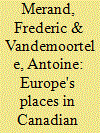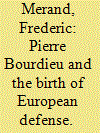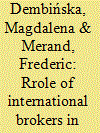|
|
|
Sort Order |
|
|
|
Items / Page
|
|
|
|
|
|
|
| Srl | Item |
| 1 |
ID:
106836


|
|
|
| 2 |
ID:
097373


|
|
|
|
|
| Publication |
2010.
|
| Summary/Abstract |
This paper uses an analytical framework derived from Pierre Bourdieu's sociology to explain the genesis of the European Security and Defense Policy (ESDP). Long-term social and institutional processes at work in the making of ESDP are addressed through an emphasis on the institutionalization of social fields, the impact of structural crises, and the socialization of policy makers into specific schemes of perception and action (habitus). Two arguments follow from this framework. First, the paper shows that the creation of ESDP after 1998 would have been impossible without the prior institutionalization of two transgovernmental arenas: (1) the European foreign policy field, wherein EU diplomats vie for influence over EU policies; and (2) the international defense field, centered upon military relations within NATO. Second, ESDP results from the strategies of a number of diplomats and military leaders who, following the end of the Cold War, perceived that they faced important organizational crises in their respective fields. This sociological framework provides a more nuanced account of ESDP's creation than that proposed by the two dominant explanations in international relations theory-realism's balancing and constructivism's strategic culture convergence. Combining structural and ideational factors, it elucidates three empirical puzzles: the lack of opposition to ESDP when it was launched, the motives of policy makers who proposed ESDP, and the disappearance of alternative options for the European security architecture.
|
|
|
|
|
|
|
|
|
|
|
|
|
|
|
|
| 3 |
ID:
163161


|
|
|
|
|
| Summary/Abstract |
The “frozen” conflict between Moldova and its separatist Transnistrian region—which developed into a de facto state—is dynamic. Despite an active nation-building project to support Transnistria’s independence and a stated willingness to join Russia, Transnistria is juggling between Russia and Europe. While economically dependent on the former’s subsidies and security guarantees, Transnistrian economic ties with the West are growing strong. While most studies are interested in the geopolitical game and the role of external actors, this article argues for a complementary approach that links macro- with meso-level analysis through the role of externally oriented domestic agents. First, the article shows that Transnistria pursues dual alignment in order to survive and provide the population with public goods for which they need external resources. Although Transnistria relies heavily on its patron state, Russia, facing recurrent crisis and external constraints, it has to search for complementary sources of income. Dual alignment is the result of this “multiple asymmetric dependence.” Second, the article argues that local intermingled economic and political interests, embodied by businessmen with close ties not only to Russia but also to Europe, account for how this balancing act is sustained. These informal international brokers or “double agents” mobilize their political connections to support dual alignment while using their Western and Eastern business connections to consolidate their power in Transnistria. It is further argued that the role of international brokers embedded in Russian and European networks and engaging in cross-border cooperation helps understand why the Transnistrian frozen conflict seems to be withering
|
|
|
|
|
|
|
|
|
|
|
|
|
|
|
|
| 4 |
ID:
071597


|
|
|
|
|
| Publication |
2006.
|
| Summary/Abstract |
Why are international institutions designed in one way and not another? Using the European security and defence policy (ESDP) as a case study, this article suggests that the social representations dominating the national and organizational world of institution-makers are key to our understanding the shape and content of an emerging institution of international security cooperation.A focus on social representations, which are the product of institutional practices, helps to break the interest/idea dichotomy that underpins most theories of preference formation when they try to explain institutional designs.This article shows that foreign and defence policy-makers from France, Germany and the United Kingdom have shaped ESDP by projecting their respective social representations, notably with regard to the role of the state, the nature of security challenges and the purpose of their organization.
|
|
|
|
|
|
|
|
|
|
|
|
|
|
|
|
| 5 |
ID:
096854


|
|
|
|
|
| Publication |
2009.
|
| Summary/Abstract |
This paper analyzes the preferences of European defense actors vis- -vis the European security and defense policy (ESDP) with a view to identifying the main ideational points of convergence and fault lines that structure this policy domain. In an exploratory analysis that relies on an original data-set compiled from systematic interviews conducted with 73 ESDP actors in France, the UK, Germany, and Brussels, we address two research questions. First, what do ESDP actors think about ESDP? Second, can we classify their preferences according to sociological factors that underpin the ESDP domain? To conceptualize the belief system of ESDP actors, we propose a typology that distinguishes (1) the social context in which ESDP actors are embedded and (2) the specific ESDP aspects about which preferences are shaped. Our results suggest that both national and occupational variables play an important role in explaining the preferences of ESDP actors.
|
|
|
|
|
|
|
|
|
|
|
|
|
|
|
|
|
|
|
|
|